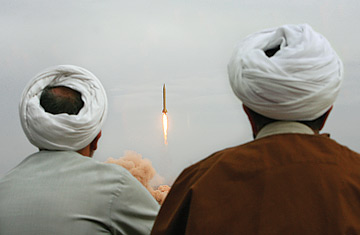
Iranian clergymen watch a Shahab-3 long-range ballistic missile fired by Iran's Revolutionary Guards in the desert outside the holy city of Qom in November 2006.
Distinguishing Iraqis from Iranians can be hard. Iraq's most revered cleric, Grand Ayatullah Husaini Sistani, speaks Arabic with a thick Persian accent. (Sistan-Baluchestan is the name of a province in southeastern Iran.) Meanwhile, across the border, Iran's top judge, Ayatullah Mahmoud Hashemi Shahroudi, struggles with Persian, the residue of an Iraqi birth. Theological cross-pollination and political exile have created deep ties between the two Shi'ite communities--and that's exactly what the U.S. is afraid of. In his speech last week announcing plans to send more than 20,000 additional troops to Iraq, President Bush warned that if the U.S. left, "Iran would be...

